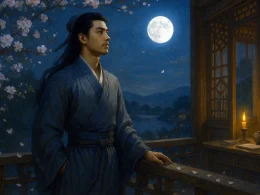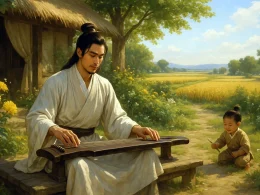In early autumn I'm sad to see falling leaves;
They're dreary like a roamer's heart which their fall grieves.
They twist and twirl as if struggling against the breeze;
I seem to hear them cry, "We will not leave our trees."
Original Poem
「落叶」
孔绍安
早秋惊落叶,飘零似客心。
翻飞未肯下,犹言惜故林。
Interpretation
This poem was composed by Kong Shao'an during the early Tang Dynasty. Having served in both the Sui and Tang courts amidst turbulent times, Kong maintained a reputation for integrity. Through the imagery of autumn leaves, the poem conveys his lament and resignation toward life's vicissitudes. While adopting the traditional "object-expressing-aspiration" technique, its genuine emotion makes it an exemplary work of personal reflection through natural imagery.
First Couplet: "早秋惊落叶,飘零似客心。"
Zǎo qiū jīng luò yè, piāo líng shì kè xīn.
Startled by early autumn's falling leaves,
Their drifting mirrors this wanderer's grief.
The opening establishes the season with "early autumn," while "startled" injects emotional intensity, transforming natural phenomena into human resonance. The leaves' aimless descent parallels the poet's rootless existence—melancholic yet without bitterness, pure yet profound.
Second Couplet: "翻飞未肯下,犹言惜故林。"
Fān fēi wèi kěn xià, yóu yán xī gù lín.
Fluttering, reluctant to descend,
As if clinging to the grove they'd tend.
Personifying the leaves, this couplet endows them with consciousness—their hesitant fluttering embodies the poet's own reluctance to part from his metaphorical "old grove," representing homeland, bygone era, or forsaken dreams. The imagery vibrates with unresolved tension between movement and attachment.
Holistic Appreciation
Centered on falling leaves, the poem masterfully blends scene and sentiment. The "startled" reaction to early autumn signals the poet's inner tremors, where nature's cycles mirror human transience. Though never explicitly autobiographical, every line pulses with unspoken sorrow—the leaves' refusal to settle mirrors the poet's own suspended state between past and present. Compact yet expansive, the work lingers in the mind through restrained potency.
Artistic Merits
The poem excels in concise conception and unforced emotion. Employing metaphor and personification, it channels the poet's diasporic melancholy through the "falling leaves" motif. Deceptively simple language carries remarkable expressive power, particularly in the suspended motion of "fluttering, reluctant to descend"—where static observation conveys dynamic emotion. The restrained yet profound affect demonstrates the artistic allure of "object-as-heart" and "scene-as-sentiment" techniques.
Insights
Falling Leaves reminds us how nature's subtle transformations articulate human emotion's depths. Kong Shao'an's autumn leaves become vessels for life's impermanence and nostalgia for lost roots. Today, the poem still prompts reflection on our own displacements: as we move forward, our hearts perpetually glance backward; though circumstances shift, enduring attachments remain. This medieval lyric thus becomes a timeless meditation on belonging and transition.
Poem translator
Xu Yuanchong (许渊冲)
About the poet
Kong Shaoan (孔绍安), 577 A.D. - 622 A.D., a native of Shanyin (山阴), Yuezhou (越州), a descendant of Confucius.











